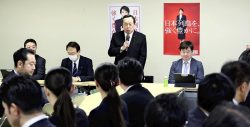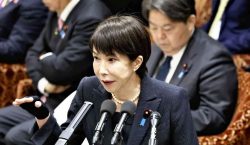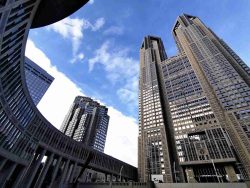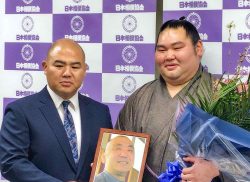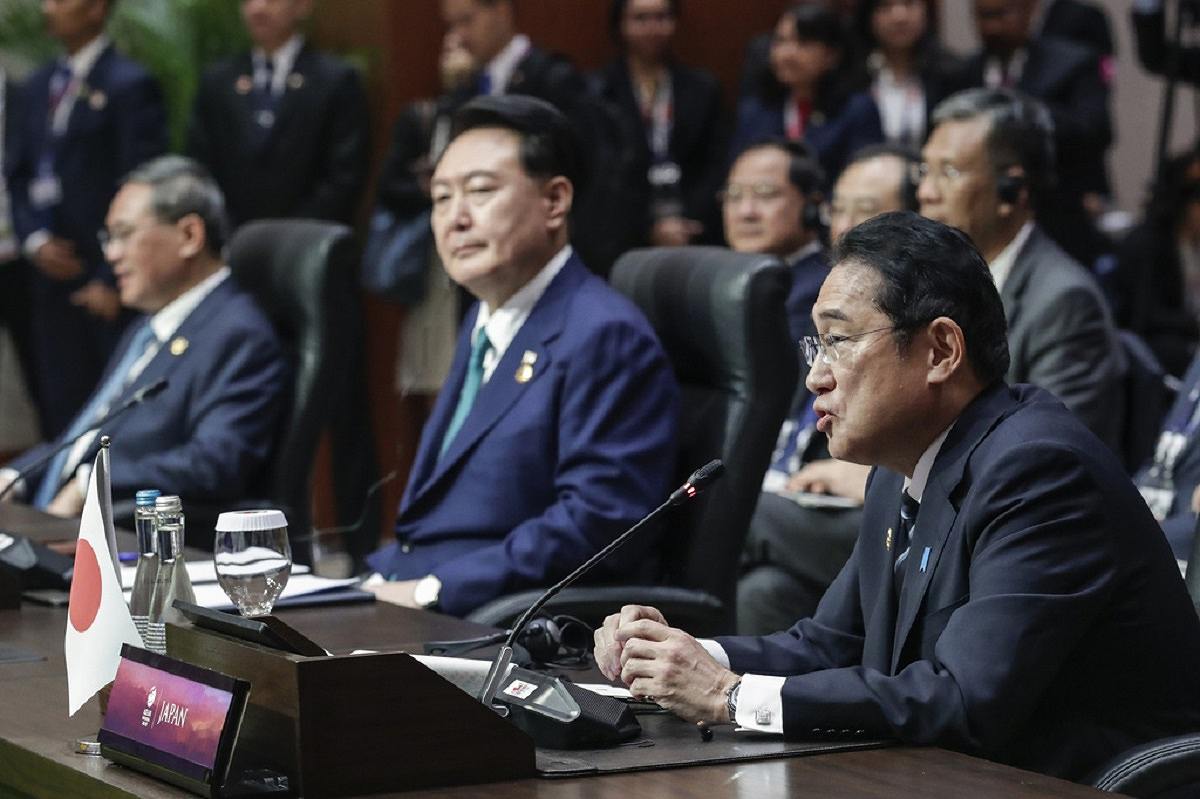
Prime Minster Fumio Kishida, right, is seen at the Association of Southeast Asian Nations Plus Three summit in Jakarta on Wednesday, as South Korean President Yoon Suk Yeol, center, and Chinese Premier Li Qiang, far left, listen to his remarks.
15:00 JST, September 7, 2023
JAKARTA — Prime Minister Fumio Kishida held brief talks Wednesday with Chinese Premier Li Qiang in Jakarta regarding Japan’s release into the ocean of treated water from the Fukushima No. 1 nuclear power plant.
China has imposed a blanket ban on Japanese marine products following the start of the discharge.
The two leaders spoke for about 15 minutes on the sidelines of the Association of Southeast Asian Nations. “I explained Japan’s stance,” Kishida told reporters after the meeting, without elaborating on whether he had demanded the removal of the ban, likely with the intention of taking a measured approach vis-a-vis Chinese public opinion.
The interaction marked the first contact between the Japanese and Chinese leaders since the treated water began to be released from the plant of Tokyo Electric Power Company Holdings, Inc. on Aug. 24.
Kishida informed Li that the ensured safety of the project was based on scientific evidence, while stressing the importance of “building constructive and stable Japan-China relations.”
Kishida also attended the ASEAN Plus Three summit meeting — comprising Japan, China and South Korea — where he sought understanding for the release of the Fukushima aqua.
“The discharge of treated water into the sea is in accordance with international standards and practices, taking all possible safety precautions into account,” Kishida told leaders at the summit. “No problems have arisen from a scientific standpoint.
“The impact of radiation on humans and the environment is negligible,” Kishida added, citing an International Atomic Energy Agency report.
Kishida further underlined that Japan’s approach had been “widely understood by the international community,” and flagged China’s suspension of all Japanese marine products as “uncommon actions.”
According to China’s state-run Xinhua news agency, Li, touched upon his own country’s position at the ASEAN Plus Three meeting, using the term “nuclear-contaminated water,” and saying the water’s disposal “concerns the global marine ecological environment and people’s health.”
However, Li’s claims are believed to have little scientific basis. The Chinese premier also called on Japan to “fully consult with its neighbors and related stakeholders.”
Top Articles in Politics
-

Japan PM Takaichi’s Cabinet Resigns en Masse
-

Sanae Takaichi Elected Prime Minister of Japan; Keeps All Cabinet Appointees from Previous Term
-

Japan’s Govt to Submit Road Map for Growth Strategy in March, PM Takaichi to Announce in Upcoming Policy Speech
-

LDP Wins Landslide Victory, Secures Single-party Majority; Ruling Coalition with JIP Poised to Secure Over 300 seats (UPDATE 1)
-

LDP Wins Historic Landslide Victory
JN ACCESS RANKING
-

Producer Behind Pop Group XG Arrested for Cocaine Possession
-

Japan PM Takaichi’s Cabinet Resigns en Masse
-

Man Infected with Measles Reportedly Dined at Restaurant in Tokyo Station
-

Israeli Ambassador to Japan Speaks about Japan’s Role in the Reconstruction of Gaza
-

Videos Plagiarized, Reposted with False Subtitles Claiming ‘Ryukyu Belongs to China’; Anti-China False Information Also Posted in Japan




